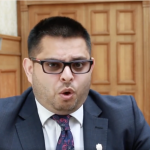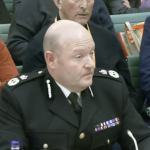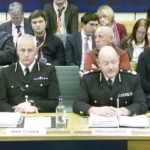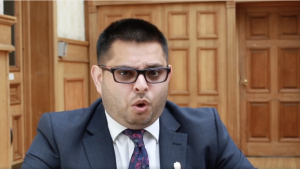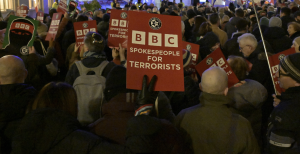The Government has announced that police are to be given greater powers to stop protests near places of worship, including mosques and synagogues.
Yvette Cooper, the Home Secretary, intends the policy to “prevent intimidating protests outside places of worship to ensure that people can pray in peace.”
It is not clear to what extent the motivation for this policy relates to antisemitism.
We have urged the Government to do what its predecessor failed to do and act to stop the intimidatory marches through our cities, which have been rife with criminality and support for proscribed terrorist organisations.
The announcement of restrictions on these marches near synagogues and other places of worship appears to be far from enough.
Ultimately, if one accepts that these marches pose a threat to synagogues and thus to the Jewish community, then why is changing their route a solution? To ask the question is to concede the point: as we have been arguing for months now, marches that threaten Jews should be prohibited. To limit the solution to protecting synagogues is to accept only that Jews are entitled to worship without intimidation, but not that they have a right to be free from intimidation anywhere else.
Not only that, but as we have been arguing for months, along with prominent KCs, police have the power to ban these marches and have declined to use those powers. The police have also already used existing powers to prohibit the marches from taking place near synagogues.
This proposal may, therefore, not be as ground-breaking or pertinent as the Government is suggesting, but we hope that this announcement is a sign of a new interest in addressing the worst crisis of antisemitism in living memory, which is being driven by these regular marches.
We look forward to engaging with the Home Secretary to bring about the urgent changes that the Jewish community and our urban centres are craving.
Give a thought to Jewish mothers
This Mother’s Day, we’ve been amplifying the voices of Jewish mothers speaking out about antisemitism and their fears for their children.
We then brought their words to non-Jewish mothers. Watch here to see how they reacted.
Extraordinary from the BBC
Several weeks ago, we submitted a request under the Freedom of Information Act to the BBC regarding the so-called documentary titled ‘Gaza: How to Survive a War Zone’.
We have received a staggering response.
Given that the BBC, like all media outlets, urges everyone to be transparent, we hoped that the BBC would have no problem responding quickly to our request asking whether the BBC made payments in relation to the so-called documentary, to whom and in what amounts – in particular whether it had made payments to Hamas or anyone affiliated to it. This was before the BBC admitted that monies had gone to a Hamas family.
Here is what the BBC wrote back to us:
“We have carefully considered your request and concluded that it is clear from your description of the information you are seeking that if the BBC held information of the kind you have asked for, it would all be held for the purposes of journalism, art or literature. The FOI Act does not apply to information held by the BBC for any of those purposes.”
The BBC then referred us to the statement that it has since published, admitting that money went to a Hamas family.
Let’s be clear: the BBC is saying that, in principle, information about money that goes to Hamas terrorists is for the purposes of journalism and can therefore remain secret.
Yes, information about money that goes to Hamas terrorists is considered journalism at the BBC.
Of course, if this happened in any other institution, the BBC would desperately be trying to expose it, on the basis that the public ‘has a right to know’. But when things happen at the BBC, the public has no right to know anything.
Now, the BBC is clutching at whatever it can in its desperate effort to do damage control over this Gaza film fiasco. But it all just goes to show why the BBC cannot be allowed to mark its own homework and why we need an independent investigation into the broadcaster – something that our polling, conducted by YouGov, shows that a majority of the British public supports.
Until there is such an investigation, the licence fee must be suspended. If you agree, please sign the petition.
It has been reported that the BBC has rejected offers of antisemitism training by the Government’s independent advisor on antisemitism. This tallies with our experience: every offer that we have made of antisemitism training to the BBC has been rejected or ignored, as have our repeated calls on the broadcaster to adopt the International Definition of Antisemitism, which would help staff and journalists understand what qualifies as antisemitic discourse.
The prospect of the BBC delivering its own antisemitism training, which has also been reported, is plainly absurd.
We are now well over a month since the BBC began to mark its own homework with an internal review into how the so-called Gaza documentary was made and broadcast and licence fee money was paid to a Hamas family. There is still no outcome to this review.
The BBC cannot be allowed to kick this into the long grass. A majority of the British public supports an independent investigation. There must be accountability for endemic BBC bias.
Until there is a proper investigation, the licence fee must be suspended.
In the meantime, there continue to be instances of the BBC putting its thumb on the scales, for example a producer was recently caught requesting an Israeli guest who would be critical of the Israeli Prime Minister. This is not news; it is narrative. The BBC has issued an “unreserved apology” to the Israeli embassy.
Not everybody at the BBC is apologetic, however.
BBC international editor Jeremy Bowen has reportedly claimed that Israel has refused to allow foreign journalists into Gaza to report on the war against Hamas “because there’s stuff there they don’t want us to see.”
It is odd that Mr Bowen would care one way or another, given his record of misreporting things that he does see and refusing to apologise for doing so.
We need an independent investigation into bias at the BBC. Until then, the licence fee must be suspended.
Rogue venues are screening the BBC’s so-called Gaza documentary
Now, the Cubit Gallery is planning to hold a screening this week of ‘Gaza: How to Survive a Warzone’, the same so-called documentary that the BBC removed from iPlayer after it was revealed that it spotlighted the family member of a Hamas official. The event is being hosted by the Islington branch of the Palestine Solidarity Campaign who, in their description of the event, make reference to “pressure from the Zionist lobby”.
Hamas is an antisemitic genocidal terror organisation responsible for the 7th October attacks in which they murdered some 1,200 people and kidnapped 251. One of the documentary’s cameramen reportedly celebrated the attacks. This documentary is little more than Hamas propaganda, and we will not stay silent about it. Hamas terrorists also still hold 59 hostages in Gaza, and we need all of them home.
We are writing to the Charity Commission regarding the screening, as the Cubit Gallery is a registered charity.
A “right to armed resistance” at Manchester University
Last week, the University of Manchester’s Students’ Union passed a scandalous motion.
One part of the motion reads: “International law enshrines a right to resist occupation…” It also states: “In recognising that, as an occupied nation, the people of Palestine have the right to armed resistance under international law.” The motion can be read in full here.
Yet again, Manchester University Students’ Union has disregarded the concerns of Jewish students to push through a reckless and divisive motion.
Whether or not it is meant as such here, the phrase ‘armed resistance’ is commonly used in this context as a euphemism for terrorism and the destruction of the Jewish state. At a minimum, this motion aspires to deprive the Jewish people of their right to self-determination.
These motions do nothing to change things in the Middle East but contribute to the ostracisation of Jewish students on campus.
Our lawyers are examining whether the motion runs afoul of charitable or criminal law, and we are supporting affected Jewish students.
We have written to the University and the Students’ Union and, if necessary, we will write to the Charity Commission as well.
Naomi, a Jewish student at the University of Manchester, told Campaign Against Antisemitism: “Despite our concerns about this deeply troubling motion, the Students’ Union proceeded with discussions on the Solidarity with Palestine policy. Prior to the assembly, they invited us to a meeting where we voiced our concerns. While they assured us that the policy’s demands cannot be enforced due to the Union’s charitable status, they also acknowledged that its only real impact would be fostering intimidation, an unwelcoming atmosphere, and hostility toward Jewish students and those who proudly support Israel.
“They are trying to create an environment where you have to disavow Israel and your identity to be accepted. This is not what I came to university for, and it is no longer a place where I feel comfortable. What is the university administration going to do about it?”
King’s College London (KCL)
We are also supporting a student at KCL, where the Students’ Union, in a staggering decision, has issued a “formal warning” against a student society that hosted a speaking event which was disrupted by anti-Israel activists with chants of “From the River to the Sea”, rather than to the protesters themselves.
The event, which took place on 27th February, was titled ‘From Conflict to Connection: Israelis & Iranians in Dialogue’, and featured guest speaker Faezeh Alavi, an Iranian researcher and artist, speaking sympathetically about the future of Israel and Iran. The chanting came as part of a barrage of intimidation tactics targeting Ms Alavi and the organiser of the event. Security was forced to escort Ms Alavi out of the lecture theatre, and the event was swiftly and abruptly terminated. Students then continued their abuse and disruption outside the lecture theatre and throughout the corridors of the building.
Following the incident, we wrote to the University calling on the administration to take action and we have been supporting the Jewish KCL student who moderated the event.
Speaking to Campaign Against Antisemitism, the student said that as the day of the event progressed, they became “acutely aware that the event may cause some unnecessary commotion and welcome some unreceptive audience members” owing to spurious information appearing on the event’s sign-up sheet. Approximately fifteen minutes into the event, a “pre-planned” and “premeditated” outburst occurred, alarming the speaker.
The student said: “From what was supposed to be an opportunity to bring together two uncommon allies and opinions that are often silenced in a world flooded with misinformation, became a wholly negative experience where antisemitism was given a lecture room to spread and be promoted to the masses under the guise of being anti-Israel.”
The student alleges that KCL offered virtually no support to him following the incident: “It seems as if the mental hell that I had been dragged through was not enough to get in contact with me. Quite telling, isn’t it? To this day, I am yet to hear from any member of security or any member of a ministerial or senior level at KCL consoling myself, Faezeh, or my guests, or apologising for the disruption.”
The student has now also revealed that the KCL Students for Justice in Palestine Society has since reached out to him, but “failed to apologise directly”.
The student has also disclosed to us that, ten days after the incident, they received an e-mail from KCL’s Students’ Union (KCLSU) informing them that rather than taking action against those who disrupted the event, it was KCL’s Geopolitics Forum – the society to which the student belongs – that received a “formal warning”.
In an e-mail seen by Campaign Against Antisemitism, it was stated that supposed misconduct on the part of the Geopolitics Forum included “behaviour that has a negative impact on other people,” “theft, misuse of funds or damage to KCLSU property,” “actions that are in contravention of KCLSU’s values and likely to damage the reputation of KCLSU or KCL,” and “actions that knowingly or willingly expose KCLSU to threat of legal action”. The e-mail appears to be a staggering example of victim-blaming.
The student forwarded this e-mail to a senior KCL staff member, who allegedly referred to the action as “a clumsy move” from the Students’ Union. When asked whether they felt that the University was supporting its Jewish students, the student replied: “This is drivel. Total nonsense.”
We reached out to KCLSU but they declined to provide a comment, citing confidentiality around student disciplinary issues.
A spokesperson for KCL said: “We are investigating the disruption at a recent student society event in line with our policies and procedures for protest. We fully support and are committed to upholding the right of freedom of speech and of protest within the law, however the safety and wellbeing of our community and visitors to our campuses is our absolute priority. Since October 7 we have engaged with our Israeli, Jewish and wider student societies, to listen to any concerns and provide extensive pastoral support. In response to concerns for safety, both on campus and across London more generally, we have enhanced security measures to keep our community safe on campus.”
KCL and its students’ union should be protecting its Jewish students, not persecuting them. Is it any wonder that only 3% of British Jews are confident that if a Jewish student reported an antisemitic incident on campus, the university’s administration would take appropriate action?
This incident is a stain on KCL. It should issue an apology to the Jewish student and finally go after not the victim but the people who perpetrated the disruption of the event.
University College London (UCL)
Elsewhere in London, masked anti-Israel thugs stopped students and staff from entering UCL while chanting: “Resistance is glorious. We will be victorious!”
Jewish students on campus deserve better, and UCL is failing them.
If any students are concerned about antisemitism on campus or need assistance, they can call us on 0330 822 0321, or e-mail [email protected].
It is good to see the Government finally showing interest in addressing the worst crisis of antisemitism in living memory.
As a starting point, we need to see real measures to tackle the regular marches, and action regarding the BBC.
We will engage with the Government to bring about those measures – but we will never be afraid to call out failings or hold institutions to account when we believe that they fall short in their duty to defend British Jews.




